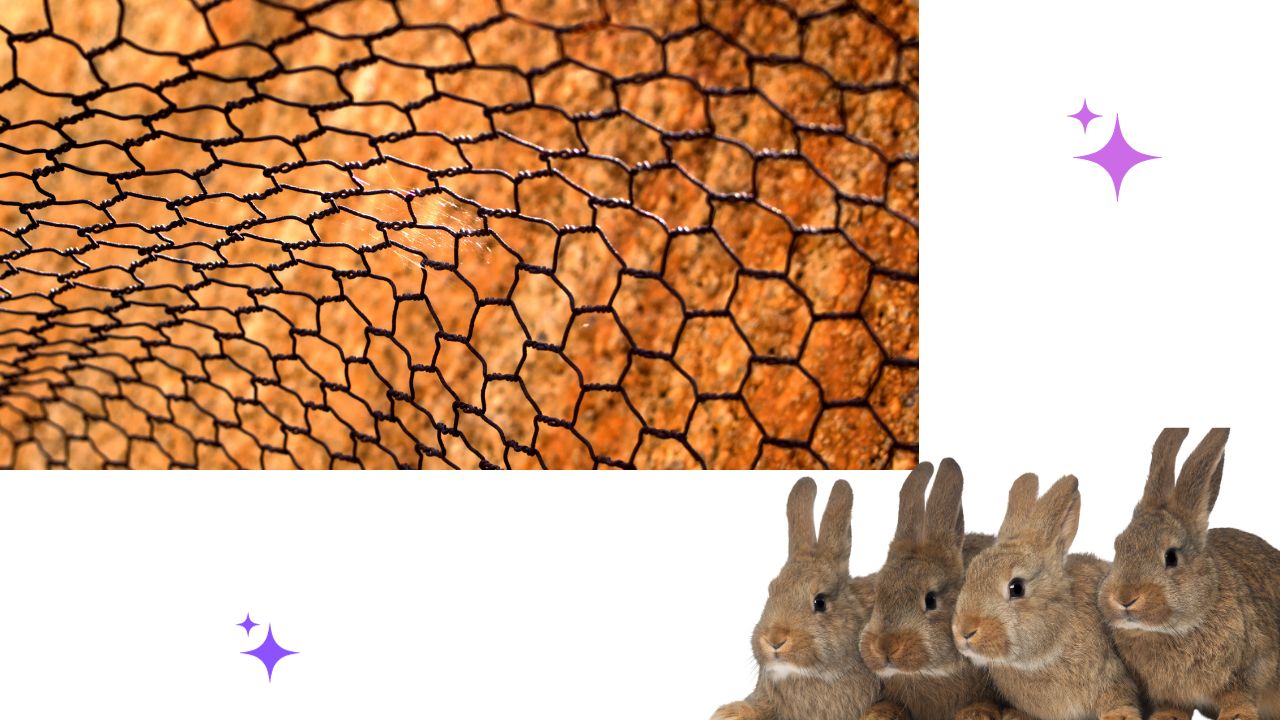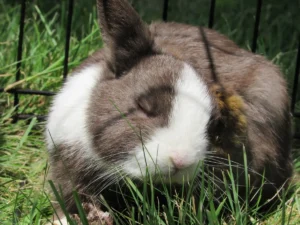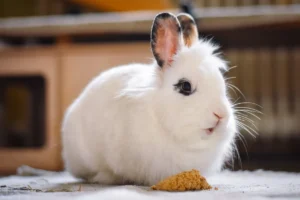Are you worried that rabbits can chew through your chicken wire? Well, you're not alone! Many people have concerns about the strength of chicken wire when it comes to keeping rabbits out.
In this article, we will delve into the chewing behavior of rabbits and provide you with valuable information about the strength of chicken wire. By understanding the factors that affect a rabbit's ability to chew through it, you can make an informed decision on whether chicken wire is the best option for rabbit proofing.
Key Takeaways
- Rabbits chew around 120 to 150 times per minute, making their chewing behavior frequent and important for their dental health.
- Chicken wire may not be strong enough to prevent rabbits from chewing through, so it is important to consider the durability and strength factors of different types of chicken wire.
- Factors such as material thickness, gaps between wires, and using materials like stainless steel or aluminum can affect a rabbit's ability to chew through chicken wire.
- Alternatives to chicken wire, such as hardware cloth or welded wire mesh, provide better protection against rabbit chewing and can be harder for rabbits to chew through.
The Chewing Behavior of Rabbits
You should observe how many times rabbits chew per minute to understand their chewing behavior.
Common rabbit chewing behaviors include chewing on food, toys, and various household items.
Rabbits have a natural instinct to chew in order to wear down their continuously growing teeth. On average, rabbits chew around 120 to 150 times per minute. This constant chewing helps them maintain dental health and prevents their teeth from becoming overgrown.
However, it can also lead to destructive behavior when they chew on household items such as furniture, wires, or carpets. To prevent rabbit chewing on household items, it's important to provide them with appropriate chew toys and ensure they have a balanced diet with plenty of roughage.
Additionally, rabbit-proofing your home by keeping valuable or dangerous items out of their reach can help redirect their chewing behavior.
Understanding the Strength of Chicken Wire
It's important to carefully consider the strength of chicken wire when using it as a barrier for rabbits, as some varieties may not be strong enough to prevent them from chewing through it. When choosing chicken wire, it is essential to evaluate its potential weaknesses and durability factors. To help you make an informed decision, here is a table comparing different types of chicken wire:
| Type of Chicken Wire | Potential Weaknesses | Durability Factors |
|---|---|---|
| Standard Gauge | May have larger gaps | Adequate strength |
| Heavy Duty | More expensive | Extra strength |
| Vinyl-Coated | Can chip or peel | Weather-resistant |
| Galvanized | Corrosion over time | Long-lasting |
Factors That Affect Rabbit's Ability to Chew Through Chicken Wire
To effectively prevent rabbits from chewing through chicken wire, it's crucial to consider the strength and durability factors that can affect their ability to do so. Rabbits have strong teeth that continuously grow, making them natural chewers. However, certain materials can deter their chewing habits more effectively than others.
Here are four factors to consider:
- Material thickness: Thicker chicken wire is more resistant to rabbit chewing than thinner wire.
- Coating: A galvanized or PVC-coated chicken wire provides an additional layer of protection against rabbit teeth.
- Wire spacing: Smaller gaps between the wires make it harder for rabbits to get a good grip and chew through.
- Material composition: Using materials such as stainless steel or aluminum can significantly reduce the chances of rabbits chewing through the wire.
Alternatives to Chicken Wire for Rabbit Proofing
Consider using hardware cloth or welded wire mesh as effective alternatives for rabbit proofing. These options provide stronger protection against chewing compared to chicken wire. Rabbit fencing is crucial in preventing these furry creatures from damaging your garden or escaping from their enclosures.
While chicken wire may seem like a suitable option, rabbits have been known to chew through it over time. This is where mesh wire alternatives, such as hardware cloth or welded wire mesh, come into play. These options are made from stronger materials and have smaller gaps between the wires, making it harder for rabbits to chew through.
Tips for Effectively Using Chicken Wire to Protect Against Rabbits
When using chicken wire, be sure to securely fasten it to the ground using stakes and zip ties, so that rabbits can't squeeze underneath it. Rabbit proofing your garden is essential to protect your plants from the hungry critters. Here are some tips for effectively using chicken wire to keep rabbits out:
- Choose the right gauge of chicken wire: Opt for a gauge that's small enough to prevent rabbits from squeezing through. A 1-inch or smaller mesh size is ideal.
- Ensure proper installation: Dig a trench around the perimeter of your garden and bury the chicken wire at least 6 inches below the ground. This will prevent rabbits from burrowing underneath.
- Use additional reinforcement: Attach a layer of chicken wire to the bottom of your fence or enclosure to prevent rabbits from digging their way in.
- Maintain regular inspections: Check the chicken wire regularly for any signs of damage or gaps. Repair or replace it as necessary to maintain a secure barrier.
Frequently Asked Questions
How Long Does It Typically Take for a Rabbit to Chew Through Chicken Wire?
To prevent rabbits from chewing through chicken wire, reinforce it with galvanized hardware cloth. Signs of rabbit chewing include damaged wire edges and holes. Reinforcing the wire can deter rabbits and protect your garden.
Can Rabbits Chew Through Other Types of Materials Besides Chicken Wire?
Rabbits have strong teeth and a natural instinct to chew. While chicken wire may not always be sufficient, there are alternative materials such as hardware cloth or welded wire that can be used for rabbit-proofing.
Is There a Specific Gauge of Chicken Wire That Is More Resistant to Rabbit Chewing?
Yes, there are gauge options for chicken wire that can be more resistant to rabbit chewing. Additionally, you may consider using alternative materials such as hardware cloth or welded wire for added protection.
Are There Any Natural Deterrents or Repellents That Can Be Used to Prevent Rabbits From Chewing Through Chicken Wire?
To prevent rabbits from chewing through chicken wire, you can use natural deterrents like hot pepper spray or predator urine. Additionally, using barriers such as hardware cloth or electric fencing can be effective in keeping rabbits out.
Can Rabbits Chew Through Multiple Layers of Chicken Wire if They Are Stacked Together?
Yes, rabbits can chew through metal wire, including chicken wire. If you're looking for alternative materials to protect your garden from rabbits, consider using hardware cloth or welded wire mesh.
Conclusion
Rabbits possess impressive chewing capabilities, but their ability to chew through chicken wire is limited. The strength of chicken wire, combined with its small openings, makes it a reliable barrier against these furry nibblers. Factors such as wire thickness and coating can further enhance its resistance.
However, it's important to consider alternatives to chicken wire for rabbit proofing, such as hardware cloth or electric fencing. When using chicken wire, ensure proper installation and maintenance to effectively protect against rabbits' relentless teeth.





